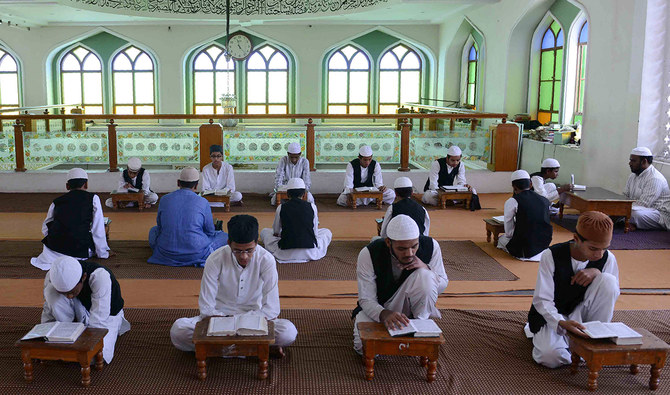Muslim teachers said on Tuesday they would appeal a verdict by a court in Uttar Pradesh, which has effectively banned Islamic schools in India’s most populous state.
Last week’s ruling scraped a 2004 law governing madrasas in Uttar Pradesh, with the Allahabad High Court saying it violated India’s constitutional secularism and ordering that students be moved to conventional schools.
Islam is the second largest religion in Uttar Pradesh, accounting for some 20 percent of its 230 million population. Around 2.6 million students in the state study at Muslim religious schools, according to the Uttar Pradesh Board of Madrasa Education data.
“We are going to the Supreme Court, no doubt about it. The Allahabad High Court’s ruling is unconstitutional, it violates Article 30 of the Constitution that allows for minorities to run own educational institutions,” Wahidullah Khan, secretary-general of the All-India Teachers Association Madaris Arabia, told Arab News.
“We have hope that the Supreme Court will give us justice.”
Madrasas provide a system of education in which students are taught Qur’an, Islamic history and general subjects like math and science.”
“Teachers are highly qualified in madrasas. What is the point of putting the kids in different schools? Our kids are as good in English education as kids in normal schools,” said Azaz Ahmed, president of the Islamic Madrasa Modernization Teachers Association of India, which also plans to challenge the high court’s ruling.
Ahmed said he was hopeful that despite the Uttar Pradesh chief minister’s announcement, the state’s government would step in to prevent the dismantling of Islamic schools.
“We are planning to approach the Supreme Court, but what we need is immediate relief. Hope the government takes some prompt action and finds a way out,” he said.
Iftikhar Ahmed Javed, chairman of the Uttar Pradesh Board of Madrasa Education and member of the ruling Bharatiya Janata Party, told Arab News the state’s administration was also discussing whether the verdict should be challenged in the top court.
“I feel that the verdict should be challenged in the Supreme Court. But this decision must come from the chief minister, education minister and big bureaucrats,” he said.
“The verdict is a big setback.”
Javed said most madrasa students in the state came from poor backgrounds and the schools offered them education for free. They were also no burden on the state budget as out of nearly 25,000 madrasas, only 560 receive government funding.
“They are run on zakat or donations,” Javed said. “If the madrasas get closed, then poor people will be the victims, particularly girls who will not be encouraged to go to any other school … If you attack education, then society gets diminished, and this is the challenge before us.”
Another challenge will be getting his party’s government on the same page.
On Saturday, Uttar Pradesh Chief Minister Yogi Adityanath, also a BJP member, told Indian media his government respected the court’s order and would implement it in phases.
For Asad Rizvi, a political commentator in the state’s capital of Lucknow, it was not likely that Adityanath would backtrack on the plan.
“In Uttar Pradesh, long before the Allahabad High Court verdict, there have been consistent attempts by the state government to disturb Muslim primary education,” Rizvi told Arab News.
“Just before the Allahabad High Court verdict, the government terminated the contracts of all those teachers who were teaching science in madrasas. Those teachers were both Hindu and Muslims, and Muslim kids were the beneficiaries.
“Muslims who can’t afford education, even in government schools, used to get basic education in these madrasas. Madrasas have been playing an instrumental role in advancing the country’s literacy rate.”






















